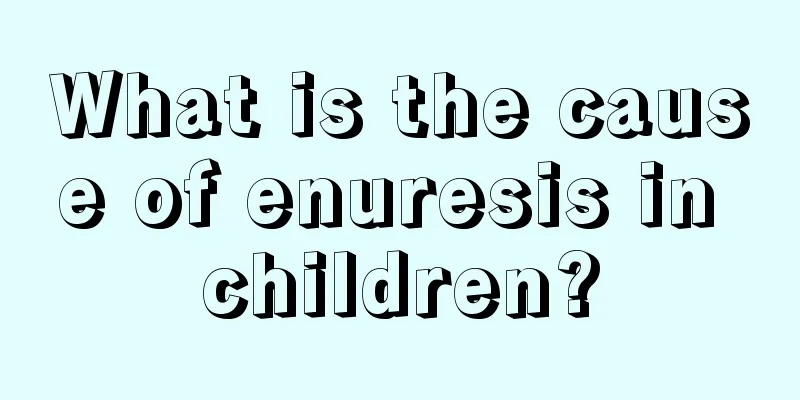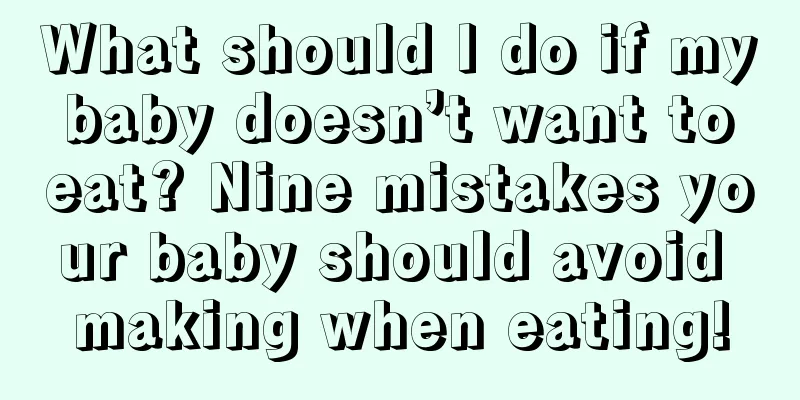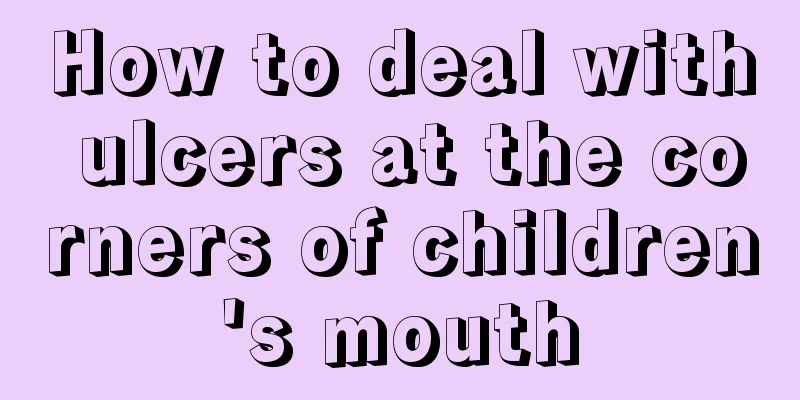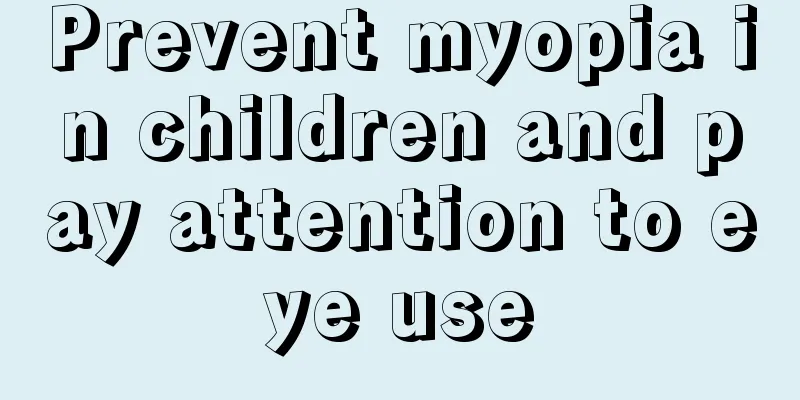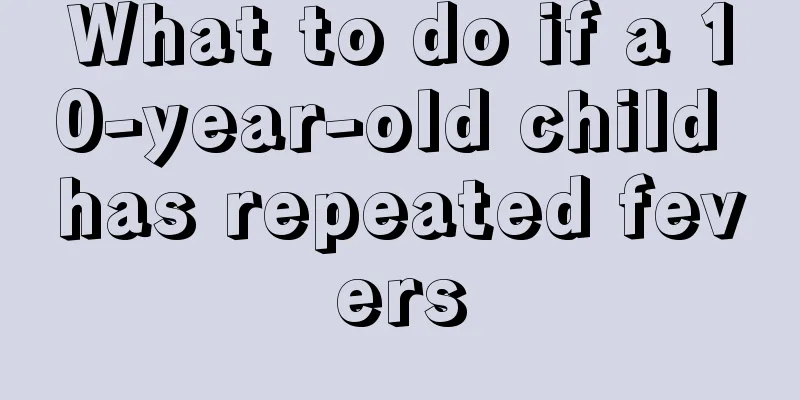What to do if your baby has a runny nose and cough
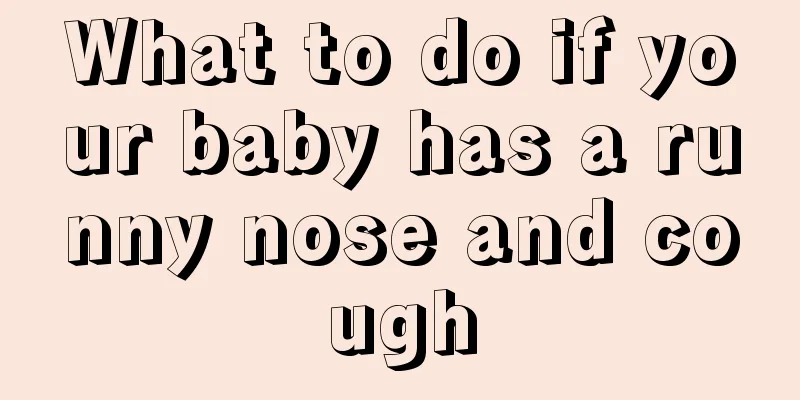
|
As a mother, you should know how to treat the runny nose caused by your baby's cold and cough. Especially when your baby has a cough and a runny nose, you should know that your baby may have rhinitis. You need to expel the germs from your baby's nasal cavity. At this time, you should take medicine according to the doctor's advice, and you should take good care of your baby. You should take your baby out to get more sun, which can improve your baby's body resistance. What to do if your baby has a cough and runny nose When a baby has a cough and a runny nose, the first thing parents think of is what medicine to give the baby. In fact, coughing and runny nose are common symptoms of baby colds, which can help babies expel cold viruses from their bodies. So the most important thing is care. 1. If your baby's nasal discharge changes from clear to yellow, it means that the child's immune system is fighting the virus. Don't rush to use antibiotics for your baby. You can spray some water into your baby's nose. Use a few drops of saline solution to dilute the dry mucus before treating it. 2. You can also use a soft handkerchief to wipe the running nose. Because the baby's skin is very delicate, wiping too much will make the baby feel uncomfortable. So after wiping the nose, you can cover it with a wet towel and then lightly apply a little oil to prevent skin cracking and pain. 3. Use a humidifier to keep your child’s room moist and cool, and pay attention to the hygiene of the humidifier. Or let your child take a bath in a steamy bathroom. When your child is sleeping, give him a pillow to elevate his head so that his snot can flow more smoothly. 4. If the baby coughs severely, parents can try some cough relief methods, such as filling a hot water bottle with hot water at about 40°C, wrapping it with a thin towel, and then applying it to the baby's back near the lungs. This can speed up the expulsion of cold and stop the cough quickly. Don't forget to put some underwear on your baby before applying the mask, and be careful not to burn your baby. Why does my baby have a cough and a runny nose? Coughing and runny nose are common symptoms of colds. 80% to 90% of colds are caused by viruses, and there are more than 200 types of viruses that can cause colds; 10% to 20% of colds are caused by bacteria. When the body's resistance is low, viruses and bacteria will take advantage of the situation and make the baby sick. Why are babies prone to catching colds? This is determined by the children's own physiological characteristics. Children's internal organs are delicate, their immune systems are not fully developed, their disease resistance is poor, and they cannot adjust to cold or heat on their own. In addition, babies are lively and active, and often sweat profusely while playing. Once you calm down, it's easy to catch a cold. If the disease is not treated promptly, serious complications will quickly occur. It is quite common for babies to catch 5 to 6 colds a year. Typical symptoms of a cold include: runny nose, blocked nose, cough, sore throat, tiredness, loss of appetite, and fever. When babies under one year old catch a cold, they often experience fever (body temperature over 38°C), cough, red eyes, sore throat, and runny nose. Babies with a cold often have a decreased appetite. A common cold lasts for 7 to 10 days, but in babies it can last for about 2 weeks. The cough is often the last symptom to go away and it often lasts for several weeks. When your baby catches a cold, parents must follow the doctor's instructions to provide home care, let the baby get enough rest, and only resume free activities after the symptoms disappear. How to care for a baby with a cough and runny nose The key is to enhance the body's resistance and prevent viruses during a baby's cold. It is necessary to get more sun exposure to improve cold resistance. Try not to take your baby to crowded public places to reduce the chance of illness. If someone in your family has a cold, you should avoid contact with them and make sure to ventilate the room. At the same time, the following aspects should also be paid attention to. 1. If the baby coughs, it means that he has phlegm. If the baby is too young, he cannot cough up phlegm. Parents can help the baby to cough up the phlegm. The method is to lay the baby flat, face down, and gently pat the baby's lungs. Pat for about ten minutes each time, three to four times a day. In addition, you can give the baby some rock sugar and pear water, which can also help to reduce phlegm and relieve cough. 2. If the baby has a stuffy nose, parents can try chopping the ginger into fine pieces, then frying it in a clean iron pan until it is dry, then putting it in gauze and wrap the gauze around the baby's feet. The gauze is more breathable and can maximize the function of the ginger. 3. Let your baby get enough rest. Don't go out for a long time or play with your baby for a long time. 4. Drink more water. Drinking plenty of water can not only flush out viruses and bacteria in the throat, but also consume body heat when you have a fever and replenish the water lost due to sweating to reduce fever. 5. Eat a balanced diet. Babies with colds tend to be reluctant to eat, so parents need to feed them liquid or semi-liquid foods, such as milk, yogurt, porridge, etc. They should also eat more fresh fruits, which can ensure that they get a large amount of vitamin C to have anti-viral effects. |
<<: Baby's runny nose turns from clear to yellow
>>: Baby sneezes and has a runny nose in summer
Recommend
What should I do if my baby keeps coughing?
The health of children is what families are most ...
Is it Tourette syndrome if my child always sniffs his nose?
A child is like a blank piece of paper. He will l...
What is the cause of heel pain in a 10-year-old child?
Children are in a lively and active period, so it...
What to do if your one-year-old baby has a sore throat
If a one-year-old baby has a sore throat, parents...
Correction process and precautions for children's pigeon toes
In life, we often find that some friends have an ...
What are the symptoms of encephalitis in children?
Some children will have some acute infectious dis...
What to do if a child has acute appendicitis
Appendicitis is a relatively common disease. Alth...
What is the normal lung capacity of a child?
The health of every child is the most worrying is...
Introduction to the height standard for three-month-old babies and related information
As young parents, you must be very concerned abou...
Children with autism rehabilitation training should pay attention to these points
If a child develops autism, it will have a huge i...
Is obesity dangerous for children?
I believe everyone should be very familiar with c...
If you feed your children this in summer, you will regret it for the rest of your life
Summer is here, and it is the season with a high ...
What are the tests for ADHD in children?
Some children study in the classroom, but they al...
Why do children have neck pain?
This season is when children are prone to allergi...
How to avoid scars on children's faces
Children are very naughty. They often like to tou...


